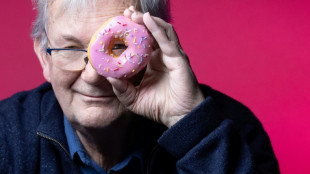
-
 Prince William plays football, volleyball in Rio on climate trip
Prince William plays football, volleyball in Rio on climate trip
-
Jamaicans mobilize aid in aftermath of Melissa's wreckage

-
 Starbucks cedes China control to Boyu Capital
Starbucks cedes China control to Boyu Capital
-
'Wild at Heart' actress Diane Ladd dies at 89

-
 Xhaka lifts Sunderland into fourth after Everton draw
Xhaka lifts Sunderland into fourth after Everton draw
-
Brazil records biggest annual fall in emissions in 15 years: report

-
 Victor Conte, mastermind of BALCO doping scandal, dead at 75: company
Victor Conte, mastermind of BALCO doping scandal, dead at 75: company
-
Trial opens in 1st US civil case on 2019 Boeing MAX crash

-
 Barrett brothers out of All Blacks' clash with Scotland
Barrett brothers out of All Blacks' clash with Scotland
-
Medieval tower partially collapses in Rome, trapping worker

-
 Arsenal's Arteta says injured Gyokeres out of Slavia Prague tie
Arsenal's Arteta says injured Gyokeres out of Slavia Prague tie
-
Alonso says 'quality' Wirtz helped get him Real Madrid job

-
 US Fed's Cook warns inflation to stay 'elevated' next year
US Fed's Cook warns inflation to stay 'elevated' next year
-
Blue heaven: huge crowds salute Los Angeles Dodgers in victory parade

-
 Dutch centrist Jetten clinches election win: final tally
Dutch centrist Jetten clinches election win: final tally
-
Mamdani extends olive branch to anxious NY business community

-
 Sierra Leone chimpanzee sanctuary reopens after deforestation protest
Sierra Leone chimpanzee sanctuary reopens after deforestation protest
-
Shein bans sex dolls after France outrage over 'childlike' ones

-
 England full-back Steward doubtful for Autumn rugby clash with Fiji
England full-back Steward doubtful for Autumn rugby clash with Fiji
-
Bayern know how to 'hurt' PSG, says Neuer

-
 Rybakina downs Swiatek to reach WTA Finals last four
Rybakina downs Swiatek to reach WTA Finals last four
-
Ex-France international Ben Yedder to stand trial on rape charges

-
 Djokovic confirmed for ATP Finals, says Italian federation boss
Djokovic confirmed for ATP Finals, says Italian federation boss
-
Trent should be remembered for 'great' Liverpool moments, says Slot

-
 Stock markets diverge despite boost from AI deals
Stock markets diverge despite boost from AI deals
-
Prince William awed by Rio on climate-focused trip to Brazil

-
 Violence in Sudan's El-Fasher could be war crimes, says top court
Violence in Sudan's El-Fasher could be war crimes, says top court
-
Rybakina downs Swiatek in WTA Finals

-
 Turkey, Muslim allies say Palestinian self-rule key to Gaza future
Turkey, Muslim allies say Palestinian self-rule key to Gaza future
-
Tens of thousands shelter as typhoon slams into Philippines

-
 Stock markets rise as tech sector buoyed by fresh AI deal
Stock markets rise as tech sector buoyed by fresh AI deal
-
Vitinha says PSG-Bayern Champions League clash will show who's 'best'

-
 Arsenal: The unstoppable Premier League force?
Arsenal: The unstoppable Premier League force?
-
Denmark inaugurates rare low-carbon hydrogen plant

-
 Springboks back Ntlabakanye call-up despite doping probe
Springboks back Ntlabakanye call-up despite doping probe
-
German plans to lower industrial power costs from January

-
 Christian, Muslim Nigerians push back on threatened US strikes
Christian, Muslim Nigerians push back on threatened US strikes
-
Nigeria's Rivers United paired with African champions Pyramids

-
 India women cricketers hail new era but challenges remain
India women cricketers hail new era but challenges remain
-
'Heroic' worker praised as man charged over UK train stabbings

-
 Bangladesh ex-PM Zia to contest elections: party
Bangladesh ex-PM Zia to contest elections: party
-
Tanzania president sworn in as opposition says hundreds killed in protests

-
 India announces $5.75 million reward for women cricket World Cup winners
India announces $5.75 million reward for women cricket World Cup winners
-
Spain regional leader resigns, a year after deadly floods

-
 Video game creators fear AI could grab the controller
Video game creators fear AI could grab the controller
-
France threatens Shein ban if 'childlike' sex dolls reappear

-
 International cricket returns to Faisalabad with Pakistan-South Africa ODIs
International cricket returns to Faisalabad with Pakistan-South Africa ODIs
-
Afghan govt says quake kills 20, injures over 500

-
 'We're all too rich,' says photo legend Martin Parr
'We're all too rich,' says photo legend Martin Parr
-
Tanzania president inaugurated as opposition says hundreds dead

| RBGPF | -3.95% | 76 | $ | |
| SCS | -0.76% | 15.84 | $ | |
| AZN | -0.83% | 81.72 | $ | |
| NGG | -0.68% | 74.74 | $ | |
| RYCEF | 1.37% | 15.36 | $ | |
| BTI | 2.38% | 52.44 | $ | |
| BCC | -3.15% | 68.34 | $ | |
| RELX | -0.16% | 44.17 | $ | |
| CMSC | -0.34% | 23.67 | $ | |
| GSK | -1.1% | 46.35 | $ | |
| RIO | -1.95% | 70.37 | $ | |
| BCE | -0.84% | 22.67 | $ | |
| JRI | -0.14% | 13.88 | $ | |
| BP | -0.75% | 34.87 | $ | |
| CMSD | -0.38% | 23.9 | $ | |
| VOD | -5.89% | 11.38 | $ |

One or two bowel movements a day keeps the doc away: study
Everybody poops sometimes, but does it really matter how often?
A new study published Tuesday in Cell Reports Medicine reveals that bowel movement frequency significantly influences physiology and long-term health, with the best outcomes linked with passing stools once or twice a day.
Previous research has suggested associations between constipation and diarrhea with higher risks of infections and neurodegenerative conditions, respectively.
But since these findings were observed in sick patients, it remained unclear whether irregular bathroom visits were the cause or result of their conditions.
"I do hope that this work will kind of open clinicians' minds a bit to the potential risks of not managing bowel movement frequencies," senior author Sean Gibbons at the Institute for Systems Biology told AFP, explaining that doctors often view irregular movements as merely a "nuisance."
Gibbons and his team collected clinical, lifestyle, and biological data -- including blood chemistry, gut microbiome, genetics and more -- from over 1,400 healthy adult volunteers with no signs of active disease.
Participants' self-reported bowel movement frequencies were categorized into four groups: constipation (one or two bowel movements per week), low-normal (three to six per week), high-normal (one to three per day), and diarrhea.
When stools linger too long in the gut, microbes exhaust the available fiber -- which they ferment into beneficial short-chain fatty acids -- and instead ferment proteins, producing toxins like p-cresol sulfate and indoxyl sulfate.
"What we found is that even in healthy people who are constipated, there is a rise in these toxins in the bloodstream," said Gibbons, noting that these toxins are particularly burdensome to the kidneys.
- Fruits and vegetables key -
In cases of diarrhea, the team found clinical chemistries indicative of inflammation and liver damage. Gibbons explained that during diarrhea, the body excretes excessive bile acid, which the liver would otherwise recycle to dissolve and absorb dietary fats.
Fiber-fermenting gut bacteria known as "strict anaerobes," associated with good health thrived in the "Goldilocks zone" of one or two poops a day. However, Gibbons emphasized that more research is needed to define this optimal range more precisely.
Demographically, younger people, women, and those with a lower body mass index tended to have less frequent bowel movements.
Hormonal and neurological differences between men and women may explain the gap, Gibbons said, along with the fact that men generally consume more food.
Finally, by pairing biological data with lifestyle questionnaires, the team painted a clear picture of those who typically fall into the Goldilocks Zone.
"It was eating more fruit and vegetables, that was the biggest signal we saw," said Gibbons, along with drinking plenty of water, regular physical activity, and eating a more plant-dominant diet.
The next step in the research could involve designing a clinical trial to manage the bowel movements of a large group of people, followed over an extended period to assess its potential in disease prevention.
L.Stucki--VB




